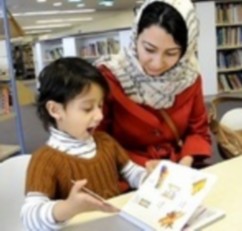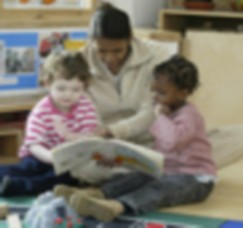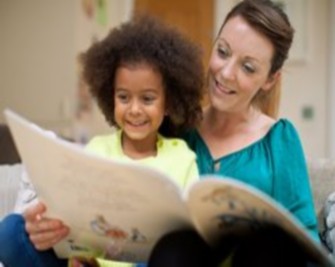| |||||||||||||||||||||||||||||||
|
| ||||||||||||||||||||||||||||||
|
Family ReadingProjects on the increase of interest towards family reading In Great Britain (England) in 1992-2009 Reading has a great impact on the moral and spiritual aspects of a human development. Reading develops logical intellection, enriches a human vocabulary and inner world, widens the range of vision, makes a person more intelligent and has a positive influence on memory. Reading is an essential process at all the stages of formation of personality since childhood when a kid is being read to by his parents to the time of maturity when a man experiences a personality crisis and grows spiritually.
Reading is extremely important at adolescence when it develops not only memory and creative thinking, but also an emotional-volitional sphere, the ability to love and forgive, sympathize, analyze and evaluate actions, follow cause-and-effect relationships between the events. Since books help to grow and bring up a holistic and harmonious personality their use is absolutely evident. But in spite of such significance of reading in a human life more and more sociologic research point out the decrease of interest towards it all over the world. In Great Britain the main coordinator of activities aimed at the increase of interest towards reading is the National Literacy Trust, an independent charity organization since 1993. Since then a lot of projects connected with reading have been implemented in all parts of Great Britain including England. One of the most important directions of project activities is aimed at work with a family, the return of reading as a key family value. We organized our research on the analysis of some family projects implemented by the National Literacy Trust as well as other organizations involved in the process of reader development among children and teenagers.
We are interested in projects because project activities mean eagerness to change the imperfect reality and thus make the perfect future closer. Such activities are able to develop practically all personal structures of a man. The movement of values, norms, standards, and the change of relationships with the people surrounding as well as learning some new procedures become visible and evident. The active personal origin of project work contains a deep stimulus to self-cultivation. I n the British society the system of measures aimed at the formation of conditions on the implementation of the process of the increase of interest towards family reading is rather diversified.
The importance of childhood and adolescence in the upbringing of personality is shown in the official governmental document of the British Department for Children, Schools and Families – “The Children’s Plan”. “The Plan and the new Department mean that more than ever before families will be at the centre of excellent, integrated services that put their needs first, regardless of traditional institutional and professional structures” [1]. The adoption of the Plan was followed by the wide-range work on the research of the public opinion about questions connected with childhood, the role of a family in the upbringing of children and problems, connected with school education. I n 2008 The National Literacy Trust published a document called “Literacy Changes Lives”. The document shows to the public the evident difference between people with high and low level of literacy. “This research presents overwhelming evidence that literacy has a significant relationship with a person’s happiness and success. It gives a clear indication of the dangers of poor literacy and also the benefits of improving literacy for the individual, the community, the workforce and the nation. Evidence also shows that literate individuals contribute to and are successful in a range of areas, and help create literate families, who live within literate communities, which contribute towards a literate nation”. [2]. Literacy influences economic wealth, civic consciousness, family life, health and cultural level of every member of society.
The target audience of the National Literacy Trust is children and teenagers, living in different parts of Great Britain. The Trust works with social institutions, schools, and libraries implementing different initiatives, programs and projects aimed at the increase of literacy level. One of the most important aspects of its activities is the work with families, because a family is considered as a natural cultural environment which provides socialization, emotional and moral formation of a child, and keeps cultural traditions of society. Since the foundation of the Trust the literacy level in population of Great Britain has increased by 24%. In 1996 on the initiative of the National Literacy Trust a project “Reading is Fundamental”, aimed at the increase of interest of children and young people towards reading and their self-realization was launched. Another objective was formation of a habit to read in the families which were not interested in reading. The project spread all over Great Britain involving not only families and schools, but also refugees’ centers, prisons, sport s clubs and other social institutions [3]. In 2005-06 within the framework of this initiative 330 local projects were being implemented (60% – in schools, 40% – in local communities). They involved about 23,000 children. 64% of project coordinators were able to engage parents as voluntary helpers, and 81% of coordinators pointed out the increase of parents’ interest towards their children’s study at school. At the present time this project is called “The National Program for Young Readers” and its aim is the increase of reading motivation of children and teenagers from problematic sectors of the British society.
The process of familiarizing children and teenagers with reading in Great Britain begins since early childhood. For this such program as “Book Start” was launched. This program was the first national program on the increase of interest towards reading among kids which did not have any analogs in the world. “Book Start” began as a pilot project in Birmingham, England in 1992. The aims of this program are to actualize the importance of reading for children since early childhood and help parents see its advantages for the development of their children.
One of the key moments of the governmental support is getting a free packet with books and a detailed instruction for parents having children of 7-9 months old. In some parts of Great Britain this pack includes audio cassettes or CDs with stories for children. Specialist on reading also visit such families at home and there is a practice of book discussion in family reading groups.
At the age of 1, 5 and 3 years children and parents are given other sets of books for these age categories. There are also free packs for children with hearing and seeing disorders, as well as blind and deaf children from their birth until the age of 4. There were organized special agencies for the support of families having children with different physical and mental disorders.
This program is financed by the state with a sponsorship of book publishers. Every child in Great Britain can become the owner of such “mini-library”. The project gives a real help to parents, demonstrates them the advantages of mutual emotional-sensuous experiences from reading with their children and thus inculcates love to reading on the very early stage of a child’s development.
“Book Start” functions in all parts of Great Britain. By now it has crossed over the borders of the United Kingdom and spread over a big number of countries of the world: Korea, Japan, Australia and others. 24 similar projects based on the “Book Start” were developed and put into practice. There is a constant link between the projects in New Zealand, the USA, Canada and others. Such relations help both organizers and participants of the project to estimate the potential of mutual activities and work out new ideas and practical deeds in the process of the increase of interest towards reading among children and their families [4].
The “Literacy Champions" program connects community volunteers with local families with children aged two to five years who would benefit from advice about supporting their children’s early literacy development by:
Through one-to-one sessions based in community settings,” Literacy Champions” volunteers encourage parents and careers to make sharing books and talking with their children part of their daily lives; promoting the importance of the home learning environment and giving practical, fun ideas for parents to support their children’s learning.
Literacy Ambassadors promote positive engagement in literacy in their community by encouraging parents with young children to take part in activities in their local area, for example, rhyme or story time sessions at the local library.
Many schools in Great Britain actively participate in projects aimed at the increase of interest towards reading among children and their families. There are a lot of such projects initiated by the National Literacy Trust. Here are some examples of such successful cooperation of school and family in England. For the implementation of the project “Family Together” in West Sussex specialists on reader development worked hand in hand with the school. They organized home meetings for families which due to different reasons could not visit training reading courses at school. This group included divorced parents, families with babies, parents feeling negative towards school as well as those who did not like reading themselves. Reading together and home environment opened for them and their children the door to the new world ofmutual emotional-sensuous experiences.
In Henry Fossett primary school in the limits of the “Family Reading” project such activities as teaching families the skills of reading books were in the focus of attention. Work-shops for parents, numerous meetings with authors and story-tellers, staging plays became the tools of building interest towards reading and book. This led to further involvement of these “new book lovers” in to the already existing reading society. In Coopers Lane primary school in Lewishem a “Father in School” project was implemented. The gist of the project was to teach fathers see, hear and understand their children better. The project helped fathers perceive the urgent necessity of a more active involvement into the life of their children, their upbringing and a more active interest in their study and life of the school.
In Berkshire in the school for boys not only fathers but also mothers took part in the work of the reading club. This helped to harmonize relationships in the family. In High School Four Dwellings secondary school in Birmingham with the help of a reader development coordinator a “Family Learning” project was put into practice. Parents had a two-hour session with a tutor and their children had a four-hour session with teachers once a week. Special attention was paid to the choice of books. As a result the most popular book was chosen. It was a “Refugee Boy” by Benjamin Zephaniah, because the author was born in Birmingham and still visits it very often. The main character of the book, Alem, is a refugee from Ethiopia who escapes to England from a violent civil war in Badme, which at the time of the novel (1999/2000), was disputed to be either in Ethiopia or in Eritrea. In 1991, five-year-old Alem and his family move to Eritrea, his mother's home country. When Alem is ten years old, he and his family move to Ethiopia, his father's country. In Ethiopia, his father gets a better job within the postal service, but Alem's mother loses her job because the Ethiopian workers say they are "at war with Eritrea, so they will not work with someone from Eritrea." Alem's father is then told by his co-workers that he must leave his wife because she is Eritrean and therefore "the enemy.
After the book was read the project participants got a better understanding of the life of refugees and decided to study this topic deeper. From local and national newspapers, magazines, on the Internet and other sources of information they started to collect information on the refugees’ problems. They made contact with one of the British schools to discuss this topic with other families.
In St Stephanie school in Lambert specialists analyzed the achievements of children at school and made a conclusion that a big number of students do not read at home at all. They defined a target group which raised special concerns. Their families did not consider reading as something prior and did not connect it with their tense and stressful lifestyle. Many families did not visit the local library at all. In the issue the idea of the reading cafe was implemented. The key concept of this projectwas to give support for children and their families on their way to reading, to increase interest towards it and to raise literacy level of parents. After two years of functioning of the club popularity of reading among children and their parents grew significantly, school results of the students improved considerably. Some parents entered for the literary classes for adults.
These examples prove that communication of children and their parents at mutual reading is an additional opportunity to have a good time together and to learn something new in each other. The spirit that connects them while reading and discussing books is the way for spiritual convergence. It is also a good way of formation of mutual understanding, tolerance, sensitivity and a positive attitude to a person living nearby. It helps to create a psychological comfort in a family. It is also useful for the formation of a wide reading community, because different social institutions are engaged in mutual activities aimed at the increase of interest towards reading among children and their families [5].
The next project “Booktime” was launched in October 2006 by the “Pearson” publishing house together with the National Literacy Trust. It was also aimed at the increase of cooperation between school and family. The primary school students got from their teacher a free set consisting of an illustrated book and the instructions for parents and careers on how to work with the book.
During the first year of its functioning the project spread over 77 counties of the United Kingdom. Analyzing the results of the project for 2006-07 researchers give figures which point out its positive results:
Local authorities and library services highly appreciated this project:89% noted its importance for further reader development and the increase of interest towards reading. The project contributed to the active involvement of a family in this process. Consolidation of mutual activities of school, local authorities and librarians is also of great importance.
In 2009 750,000 children from 20,000 schools of the United Kingdom were engaged in this project. In the beginning of the school year they received two books with guidance for parents and careers. The schools also received free resource packs with instructions, handouts, games, bookmarkers and badges [6].
“Reading champions” is another wide-scale state initiative aimed at the increase of interest towards reading among the male population of Great Britain of all ages. The project includes: Primary and secondary schools (boys, their fathers or careers, male staff of the school, librarians, specialists on reader development); local community; sports clubs and famous sportsmen who love reading; prisons (staff, librarians and prisoners). The project suggests a unique scheme on familiarizing of the male population with reading. The scheme includes such components as: flexibility(it can be used in most of the schools); methodological support (recommendations specially worked out for this project, various handouts, posters and other necessary methodological resources); facilitation (guidance on reading motivation and development of reading culture). The winners of the project are always awarded in several nominations: reading boys-champions; reading tutors-champions (a parent, a teacher, a librarian or another male who took an active part in the project). A similar project for girls is called “Reading Angels”.
Analyzing the results of such wide-scale activities on the increase of interest towards reading among children and their families in Great Britain specialists working on reader development point out the importance of family reading for children of all ages and social backgrounds. They specify the fact that that its parents who are a role model and main instance in reading for their children. 71% of young men choose mothers, 62% choose fathers as their role models. The following figures can be considered the result of such wide scale measures including project work [5]. Educational achievements in 1999-2009 The percentage of schoolchildren who reached the expected level in reading has increased by 8%, from 78% in 1999 to 86% in2009. Thefiguresinwritinghaveincreasedby13% and in the English language – by10%. These achievements are shown in the table
Literature 2. Dugdale G., Clark C. Literacy Changes Lives: An advocacy resource. – London: National Literacy Trust. (2008). 5. http://www.literacytrust.org.uk 6. http://www.booktime.org.uk/
Alexandra Shadrina, Form 10 “A” |
|||||||||||||||||||||||||||||||
|
| |||||||||||||||||||||||||||||||
| Äàòà ïîñëåäíåãî îáíîâëåíèÿ ñòðàíèöû 23.02.2017 Ñàéò ñîçäàí ïî òåõíîëîãèè «Êîíñòðóêòîð ñàéòîâ e-Publish» | |||||||||||||||||||||||||||||||





